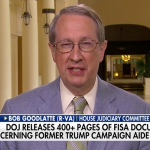 On September 10, House Judiciary Committee Chairman Bob Goodlatte (R-VA) announced the introduction of the Injunctive Authority Clarification Act of 2018 (H.R. 6730). The Committee intends to markup the legislation this week.
On September 10, House Judiciary Committee Chairman Bob Goodlatte (R-VA) announced the introduction of the Injunctive Authority Clarification Act of 2018 (H.R. 6730). The Committee intends to markup the legislation this week.
The Injunctive Authority Clarification Act restores the traditional understanding that a federal court’s injunctive power extends only to the protection of the parties before it. The bill does not disturb longstanding exceptions to this principle explicitly recognized in the Federal Rules of Civil Procedure, most notably in class action lawsuits.
Below is the Chairman’s statement on the introduction of the Injunctive Authority Clarification Act.
Chairman Goodlatte:
“Judicial overreach in the form of national injunctions has increasingly frustrated Administrations of both parties. Although the Trump Administration has been the target of over 22 national injunctions to date, the practice took off in 2015 as a means of stopping major Obama Administration policies.
“The Constitution gives courts the authority to decide cases for the parties before them, not to act as super-legislators for everyone across the country based on a single case. It simply cannot be the law that opponents of government action can seek a preliminary injunction and lose in 93 of the 94 judicial districts, win one injunction in the 94th, and through that injunction obtain a stay of government action nationwide despite it being upheld everywhere else.
“The Injunctive Authority Clarification Act of 2018 restores the proper balance of power between the branches of government. It has the support of a bipartisan group of some of America’s leading professors of remedies, federal courts, and administrative law, who recognize the compelling need for Congress to enact a limit on national injunctions. I am proud to introduce this legislation today addressing this bipartisan issue.”
Background: For the first 170 years of the Republic, there were no national injunctions precisely because courts recognized that they would go beyond the “judicial power.” Since then, there has been a gradual evolution that allowed the practice to avoid careful constitutional scrutiny, until now.
In June 2018, after examining the basis for national injunctions, Justice Thomas’s concurrence in Trump v. Hawaii concluded that in “sum, universal injunctions are legally and historically dubious. If federal courts continue to issue them, this Court is dutybound to adjudicate their authority to do so.”
National injunctions create what the Justice Department terms “an absurd situation in which a plaintiff only needs to win once to stop a national law or policy—but the government needs to win every time to carry out its policies. That makes governing all but impossible.” This creates a “shop till the statute drops” problem.
This past November, the House Judiciary Committee held a hearing entitled The Role and Impact of Nationwide Injunctions by District Courts.

